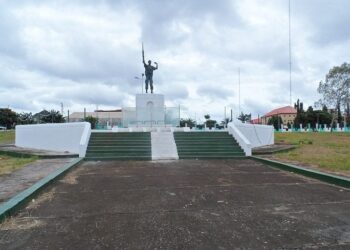The truth of the matter is that trade is a downstream segment of the business or enterprise valuechain and it really is not the most valuable part of the valuechain. That our people have remained at this point of the valuechain for over hundreds of years may mean we haven’t done enough as a community to guide ourselves.
Every industry tends to extend value to either its upstream, midstream or downstream segments of its valuechain. And since our people deal mostly in consumer products (FMCG, beverages, textiles, pharmaceuticals, electronics etc), industrial goods, spare parts, vehicles, construction materials, and in some cases industrial machinery, we can safely say that the downstream segment of these productlines are the least valuable in their individual industrial ecosystem valuechains.
For the avoidance of any doubt, I MAY BOLD TO SAY THAT owning and operating retail stores has not and will never give the Igbo Nation a competitive advantage in the long run.
The only assumed value we can expect, which we are getting already, is that some traders involved in these trades will make good margins that will eventually make some of them very wealthy. They will build large mansions, buy luxurious cars, enjoy expensive vacations, send their kids and wards to study abroad at the most expensive schools. However it will end there. They will do very well for themselves but not too well for the Igbo Nation.

In other words collectively they will not move the needle for industrial development of any State or Region in Igbo Land unless they upscale upto higher levels on the industrial valuechain which is either to backward integrate into processing or manufacturing or they upgrade all the way up the valuechain upto product design and development.
Those seeking or advocating to set up more markets in the South-East, may be well intentioned but they may not understand the value distribution embedded in ecosystems of industrial valuechains.
For instance even if these Lagos traders are convinced to set up more stores and more markets in the South-East they will still be operating at the bottom of the industrial valuechain as retailers or at the best wholesalers.
Markets will not attract development to Anambra or the South-East, they never have and they never will. If they did attract significant development, then Onitsha market which we have had for over 300 years now should have transformed Onitsha City into a more developed City than Singapore or Dubai by now, as Onitsha has hosted the largest market in Africa for over 100 years, then due to the civil war, it down graded to the largest market in West Africa for another 50 years, then more recently down to the largest market in Nigeria and so on. Not sure if it still is considered large as compared to the markets in Lagos.
Having said that, The presence of the Onitsha Main market in Onitsha has not attracted monumental investment into Anambra State and subsequently into Igbo land. And there are reasons for this. I WILL share a few reasons.
- The development we seek is such that encourages sophisticated migration. So We need educated highly skilled people to move to Anambra State, to live in Anambra State, school eat and get their entertainment in Anambra State. Highly Educated highly skilled people only move to areas where there are JOBS. Markets do not stimulate such JOBS.
You cannot develop a society without a strong highly educated highly skilled workforce. Our wealthy traders will not and cannot fill that gap. Why, you may ask? Because The manpower required to manage a market store or shop does not require sophisticated skills or a highly educated person. A secondary school leaver can effectively and efficiently run a market store. So establishment of more markets, will only mean more market traders will move to Anambra State with minimal skills required for buying and selling. This is not a bad thing onto itself but it will not move the needle of overall society’s development which is the ultimate desire.
- The reason Onitsha City even has experienced somewhat of a steady growth path ( not significant in anyway but its there) is because of the mini industrial estate that was set up there in the 1960s. So whereas the Onitsha markets have traders, those few manufacturing firms in Onitsha do have highly skilled personnel that live in Onitsha. This skilled population gas stimulated some development of highly advanced medical services, a few high quality schools etc. Although many of these skilled people have now moved to Asaba recently but that is a different conversation for another day.
- The only strategy for the repositioning of Igbo Traders at this time should be to convince enough of them to upgrade to manufacturing or even higher up the industrial valuechain. They can even upgrade to product design and development. I know a few Anambra wine traders (names withheld) who have acquired wine wineyards in Morocco, France and Califonia. This is a great first step. There are much more upgrade opportunities in various valuechain ecosystems in different productlines which can be hosted in Anambra. In the building materials space for instance POP is not produced in Nigeria on any significant level, mostly imported from Egypt. In the Food and Beverages space, whereas Lagos alone consumes over 3 million loaves of bread a day ( you read that right, 3,000,000 loaves a day), Nigeria imports almost all it’s flour and all its yeast. Yeast is easy to produce but every bakery in Nigeria imports yeast. The value we are throwing away here is in the hundreds of billions a year. I need not say more.
I can go on and on, in different industrial segments we have studied. The truth is that we, as a people, are majoring in the minors and minoring in the majors
Having said all this, let me leave you all with some strong food for thought, our institute did a study on trade in Nigeria and we discovered that whereas Igbo traders are collectively the largest group of any trading community out there, but we have no real trading powerhouse.
The top trading POWERHOUSES in Nigeria ???????? are ….
- Olam : (Indian), they are also manufacturers and currently a $25 billion company
- Churchgate (Lebanese) they are also manufacturers
- Stallion Group (Indian)
- Dana Group (indian) mostly cars, electricals, and electronics
- Jagal group ( Indian) they are also manufacturers, and FMCG
- Talerams (Indian)
- Dangote ( still a large trader )
- BUA still heavily into trade
- The Chinese are coming, the opening of the Lekki Free Trade Zone will be a game changer but let me leave it here for now.
I hope our people will apply knowledge, research and superior education to their current advantages in their collective trade communities, in order to build and retain value in industrial ecosystems going forward. Nobody will spoon feed anyone and as I have always maintained over the years…..
Complaining is not a Strategy
Dr Nicky Okoye
Founder African Enterprise and Entrepreneurship Institute






